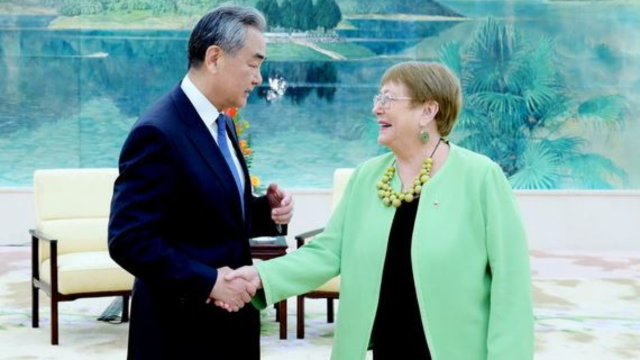Old friends? Bachelet and Wang Yi meet on October 14. Source: Ministry of Foreign Affairs of the People’s Republic of China.
A new photo opportunity with the CCP for the former UN High Commissioner for Human Rights, who failed to confront the regime on the Uyghurs’ cultural genocide.
by Marco Respinti
10/23/2025, Bitter Winter
On October 14, 2025, former Minister of Health and former President of Chile, Verónica Michelle Bachelet Jeria, commonly known as Michelle Bachelet, met with Foreign Minister of the People’s Republic of China’s (PRC) and member of the Political Bureau of the 20th Central Committee of the Chinese Communist Party (CCP), Wang Yi, while in Beijing for the “Global Leaders’ Meeting on Women” (October 13–14, 2025), co-organized by the PRC and the United Nations Programme for Gender Equality and the Empowerment of Women, succinctly known as UN Women.
It is already ridiculous that the PRC should organize and host such an event with such a pompous title on the 30th anniversary of the highly controversial “Fourth World Conference on Women,” held in Beijing in 1995, which adopted the “Beijing Declaration and Platform for Action.” What speaks for itself, in fact, is the infamous treatment reserved for women in the PRC—from the criminal days of the “One-Child Policy” to today’s equally criminal routine of forced sterilizations, coercive birth control, violence, and rape inflicted upon females belonging to persecuted ethnic and religious groups.
But judging from the pictures and the tone used by the PRC’s Ministry of Foreign Affairs, it would be even more absurd to see Bachelet and Wang smiling and shaking hands—if it were not utterly tragic.
Bachelet served as the seventh United Nations High Commissioner for Human Rights from September 1, 2018, to August 31, 2022. In that capacity, she was responsible for the Office of the High Commissioner for Human Rights (OHCHR) report entitled “Assessment of Human Rights Concerns in the Xinjiang
" data-gt-translate-attributes="[{">Xinjiang Uyghur Autonomous Region
" data-gt-translate-attributes="[{">Autonomous Region, People’s Republic of China,” published on August 31, 2022, the very day she left office.
Readers will recall that the long-overdue report’s publication was mysteriously delayed. It finally took place after much lamentation and pressure from the Uyghur diaspora and the civilized world on the last day in office of its ultimate author and drafter. Thus, the report was left in a sort of practical limbo, its force de facto depleted and reduced to little more than a sheet of paper, occasionally—and indeed quite rarely—quoted in what amounts to no more than lip service.
The political reasons for that delay were quite evident. It is indeed true that the report contains serious indictments of the situation in Xinjiang—called East Turkestan by its non-Han inhabitants—and explicitly qualifies certain acts as crimes against humanity. Yet it carefully avoids any suggestion of a possible cultural genocide in the region, while effectively preventing any serious investigation into that matter and thus postponing the problem indefinitely.
Uyghurs who have endured the cultural genocide perpetrated by the PRC had two main reactions to that long-delayed report. They strongly lamented both its late publication and its avoidance of the word “genocide.” Yet, in due course, they made a virtue of necessity by embracing the insufficient—yet still useful—denunciation of “crimes against humanity” to provoke some reaction. The problem, however, is that such responses were few and low-profile. The OHCHR could have been a powerful instrument for justice and truth; instead, its text remained another document added to the immense pile of UN papers.
Bachelet—whom the PRC’s Ministry of Foreign Affairs now calls “[…] a long-time friend of the Chinese people”—bears direct responsibility for this debacle. Yet the Chinese Ministry says that “[d]uring her tenure as UN High Commissioner for Human Rights, she upheld justice, viewed China’s development objectively and rationally, and promoted equal and friendly exchanges between the two sides.”

In her turn, Bachelet, the Ministry reports, “[…] congratulated China on successfully hosting the Global Leaders’ Meeting on Women, stating that the friendship between Chile and China has a long history. Chile was the first South American country to establish diplomatic relations with the People’s Republic of China and the first Latin American country to sign a free trade agreement with China.”
Many may forget that Chile established diplomatic relations with the PRC on December 15, 1970, under its newly elected president, Salvador Guillermo Allende Gossens (1908–1973), who had taken office on September 3 of the same year. While remembered and respected by many for his tragic death during the 1973 military coup in Chile, Allende, a medical doctor turned politician, was a hardcore socialist animated by eugenic and racist sentiments, and his government even protected a former Nazi German criminal. It is all documented by Víctor Ernesto Farías, a Chilean retired academic, in his 2005 book “Salvador Allende: Antisemitismo y eutanasia.”
One of the most striking aspects of this story is that Bachelet herself, while serving as Chile’s Minister of Health, implemented a eugenic law devised by Allende, aimed at sterilizing all “deviant” citizens.
On her visit to Beijing, the PRC Ministry of Foreign Affairs concludes: “Michelle Bachelet said she fully agrees with President Xi Jinping’s proposal to bear in mind the goal of a community with a shared future for humanity and jointly create a better future for the human race.” While Bachelet and Wang smile, those who shiver—not only Uyghurs—have good reasons.

